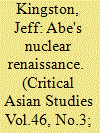|
|
|
Sort Order |
|
|
|
Items / Page
|
|
|
|
|
|
|
| Srl | Item |
| 1 |
ID:
132902


|
|
|
|
|
| Publication |
2014.
|
| Summary/Abstract |
Prime Minister Abe Shinz()'s nuclear renaissance involves downplaying risks, restarting reactors, building new ones, and exporting reactor technology and equipment. Polls in japan indicate that the public remains overwhelmingly op- posed to Abe's nuclear agenda, but in various national and local elections since late 2012 antinuclear candidates have not fared well. This article examines the disjunc-ture between public preferences and electoral outcomes and why is it likely that Japan will restart reactors despite widespread concerns about safety, the high costs of nuclear energy, and the lack of a site for permanent disposal of nuclear waste. The safety myth is being reealibrated, but the author argues that it remains based on rosy assumptions in a nation especially prone to massive seismic disasters. The reinstatement of nuclear energy in the 2014 national energy policy marks a victory for the nuclear village, a remarkable example of institutional resilience in the face of extremely adverse developments since the massive earthquake and tsunami of 1 1 March 2011 that precipitated three reactor meltdowns in Fukushima. Despite extensive revelations about shoddy safety practices in the nuclear industry and collusive relations between regulators and those they regulate, Abe has successfully promoted a nuclear revival that few would have thought possible before his election in 2012. Reactor restarts face a number of hurdles, but the pronuclear lobby now finds it has a policy opening. The summer of 2014 has been a nuclear-free one, but in all likelihood it will be Japan's last for decades to come.
|
|
|
|
|
|
|
|
|
|
|
|
|
|
|
|
| 2 |
ID:
153349


|
|
|
|
|
| Summary/Abstract |
Following a well-established research tradition on court decisions, this study analyses 524 defamation cases in China from 1993 to 2013, explores the media's success possibilities, and investigates the role of party capacity, political influence and the medium effect. Contrary to the existing assertions, we find that the media are not necessarily losing. On average, from 1993 to 2013, the success rate of news media in Chinese defamation courts was 42 per cent, and this rate has been increasing since 2005. We also find that government officials and Party organs had consistent advantages in court, while ordinary plaintiffs, magazines and websites had less success. The medium of the media (i.e. print, broadcast, internet) makes a difference, as do the government policies governing the media. In addition, local protectionism exists, but it is less rampant than expected. These findings compel us to rethink the dynamics among the media, the courts and the state, and their implications on China's institutional resilience.
|
|
|
|
|
|
|
|
|
|
|
|
|
|
|
|
|
|
|
|
|